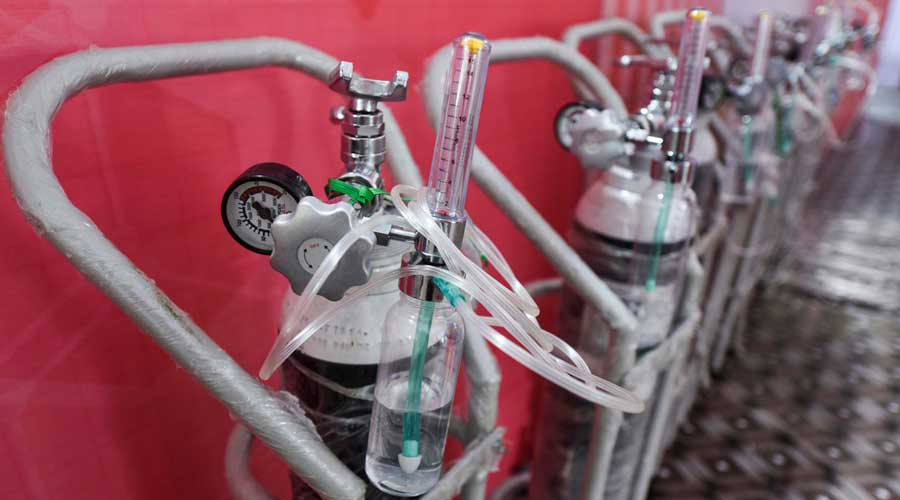The sub-group constituted by the Supreme Court to audit Oxygen consumption in hospitals in national capital during the second wave of COVID-19 said that the Delhi government exaggerated" the consumption of oxygen and made a claim of 1140 MT, four times higher than the formula for bed capacity requirement of 289 MT.
The five-member panel headed by AIIMS Director Randep Gulleria said the Delhi government had made the claims for allocation of 700 MT oxygen on April 30 of medical-grade Oxygen using a wrong formula.
The top court had on May 6 named a sub-group for carrying out the audit exercise for Delhi's health infrastructure and allocation of oxygen and said that it shall consist of Randeep Guleria of AIIMS, Sandeep Budhiraja of Max Healthcare and two IAS officers not below the rank of Joint Secretary -- one each from the Centre and the Delhi government.
The panel in its report pointed out that four model hospitals in Delhi --Singhal Hospital, Aruna Asaf Ali Hospital, ESIC Model Hospital and Liferay Hospital -- have claimed extremely high Oxygen consumption with very few beds and the claims appeared to be clearly erroneous, leading to extremely skewed information and significantly higher Oxygen requirement for the entire state of Delhi.
The panel, which submitted its interim report to the top court, said that during the meetings of the sub-group, it was repeatedly noted that there was a gross discrepancy in the data recorded from proformas.
Additional secretary, Department of Promotion of Indian Industry and Internal Trade, Government of India, expressed anguish over the way the data was collated by the Government of NCT Delhi, as it still has a lot of errors which have been pointed out. It is still not clear on what basis had an allocation of 700 MT been sought by the government of Delhi in the Supreme Court of India when collated data had so many errors and it took an Oxygen audit to point out the same, the 23-page interim report said.
The interim report, which is part of the 163-page report of the National Task Force, said It also appears that the government of India used a wrong formula and made exaggerated claims on April 30.
It was also evident that some hospitals could not differentiate between KL (Kilo Litre) and MT (Metric Tonne) and the same was not examined while projecting 700 MTs.
The report said that the Controller of Explosives, PESO has informed that Oxygen supply to Delhi and Liquid Medical Oxygen (LMO) tankers level is being monitored on daily basis and as per 8 reports on May 13, most of the LMO tanks were filled with more than 75 per cent, while few tanks are completely filled.
It is obvious that there is excess oxygen supply in NCT Delhi, which is further substantiated by the fact that NCT Delhi has picked up only 11 MT LMO from the Air Liquide plant at Panipat by 11 am on May 13. It was also pointed out that Delhi was unable to store all the LMO allotted to it and had asked the suppliers to hold Oxygen reserves at their own plants, the report said.
The panel further said in its report that tankers in Delhi are not able to off-load oxygen and lying idle as Oxygen tanks in various hospitals are completely filled.
A complaint has been received from M/s Goel Gases that their tankers have been parked at LNJP hospital and could not offload oxygen for many hours, leading to the breakdown of the supply chain. Similar instances have been observed at AIIMS, New Delhi, it said.
The panel on May 13, among many suggestions, said that a fixed quota should be made available of NCT of Delhi on an assured basis and an additional quota should be available for Delhi to lift from plants by maximum 4 pm of the day, after which the unutilized additional quota should be made available for other States to utilize as to ensure the available oxygen, capacity does not go un-utilised.
After detailed discussions, the sub-group arrived at the conclusion that the current oxygen requirement of NCT Delhi ranges from 290-400 MT of LMO. Accordingly, it is recommended that 300 MT of quota should be available for NCT of Delhi on an assured basis, the report said.
The panel said that an additional 100 MT of quota should be available for Delhi to lift from plants by 4pm of the day, after which the unutilised quota from this 100 MT should be made available for other states so that available oxygen capacity does not go unutilised.











